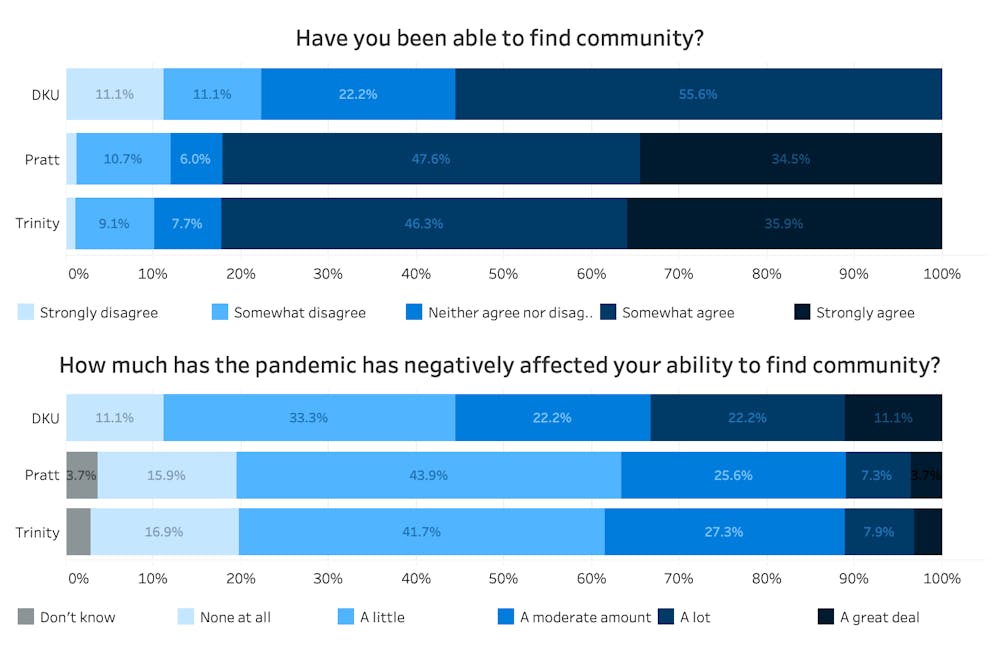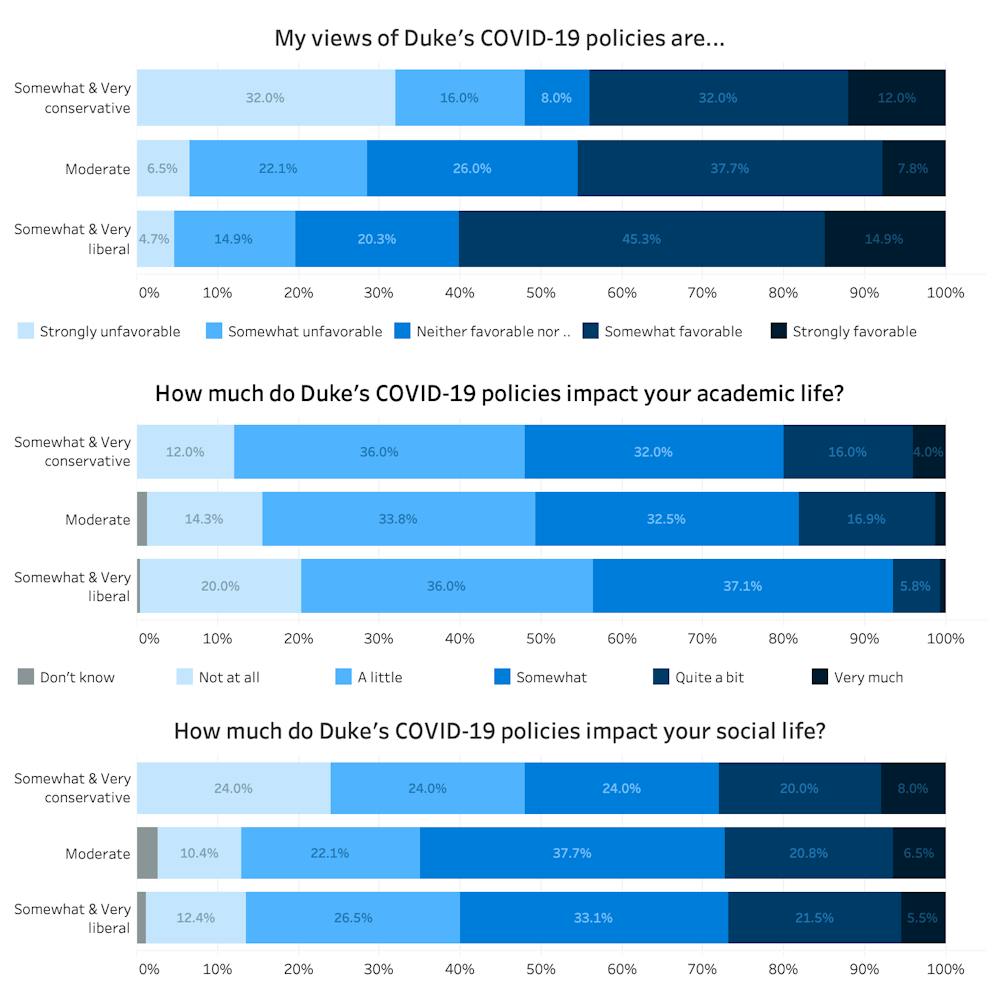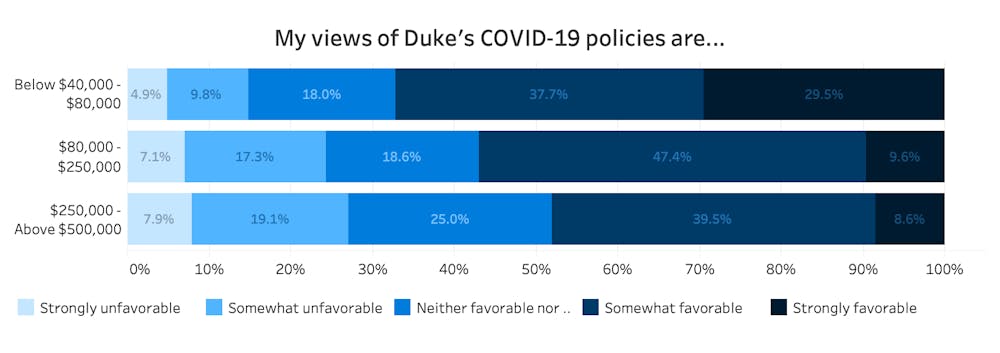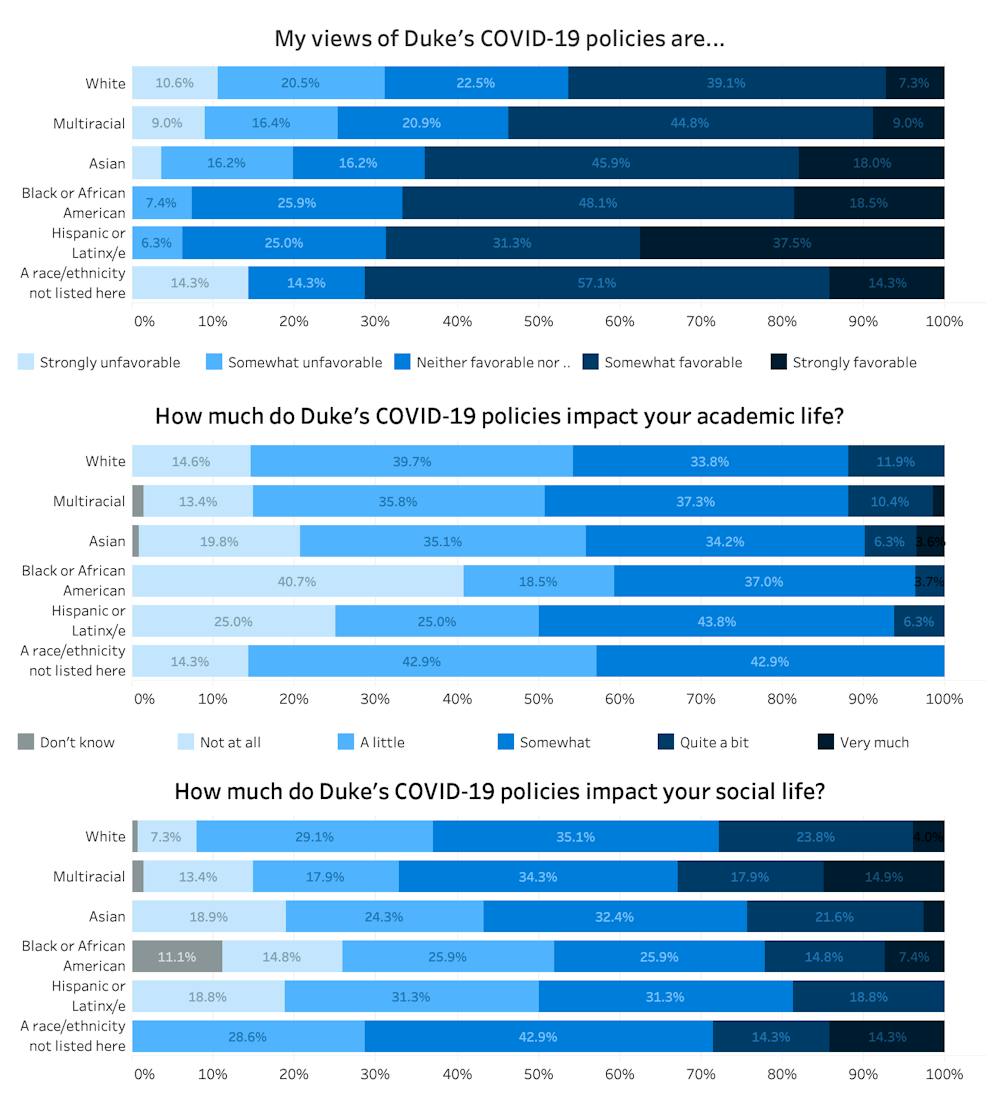Editor's note: This story is part of a series about the Class of 2025 based on a survey conducted by The Chronicle. You can read more about our methodology and limitations here, or see all of our survey coverage here.
Compared to first-years last year, the Class of 2025’s first semester at Duke was much closer to “normal.” Nonetheless, some restrictions still remain, including masks on buses and in indoor spaces.
The Chronicle asked first-years about their ability to find community on campus, how much the pandemic has affected their ability to find community, their experiences with COVID-19 on campus and their opinions on Duke’s COVID-19 policies and their impacts.
The vast majority—81.6%—of first-years “somewhat” or “strongly” agreed that they have been able to find community at Duke. This is higher than 73.5% of first-years last year who reported similarly.
Furthermore, while more than 60% of first-years last year reported that the pandemic affected their ability to find community “a great deal” or “a lot,” only 11.3% of first-years this year reported similarly. Compared to 2% of the Class of 2024 that indicated the pandemic had no negative effects at all on their ability to find community, 16.1% of the Class of 2025 indicated similarly.
In terms of where they found community, 22.4% of students reported that they primarily found community during Orientation Week, 35.9% reported in their dorms, 17.9% through clubs and extracurriculars, 10% in classes and 13.7% through other means.
This year, Duke continued its weekly surveillance testing of asymptomatic students. Only 5% of surveyed first-years reported testing positive for COVID-19, and 87.1% reported knowing someone who tested positive for COVID-19.
Duke’s COVID-19 policies have fluctuated over the fall semester. The University first announced in June that all students would undergo weekly surveillance testing regardless of vaccination status and that fully vaccinated students would not need to wear a mask in most indoor areas. As of Aug. 30, at least 98% of the student body was fully vaccinated.
Following a spike in cases Aug. 30, the University tightened masking and dining policies, requiring masks indoors and outdoors and temporarily suspending indoor dining. Duke eased its outdoor mask mandate Sept. 15, and on Oct. 6 began adding capacity for indoor dining and no longer required masks in semi-public residential spaces. On Nov. 2, the University no longer required masks in outdoor congregate settings, including athletic events.
Amid these changing policies, the majority of first-years had favorable views of Duke’s COVID-19 policies—55.6% had “somewhat” or “strongly” favorable views, compared to 23.7% who had “somewhat” or “strongly” unfavorable views.
Only 10.3% of first-years reported that Duke’s COVID-19 policies impacted their academic lives “very much” or “quite a bit.” A greater percentage of first-years—26.9%—reported that the University’s COVID-19 policies impacted their social lives to a similar degree.
Duke Kunshan first-years less likely to find community
First-years enrolled in Duke Kunshan University were more likely than first-years enrolled in Trinity or Pratt to “somewhat” or “strongly” disagree that they had found community on campus. Compared to 11.9% of Pratt first-years and 10.1% of Trinity first-years who disagreed that they found community, 22.2% of DKU first-years similarly disagreed.
Additionally, 33.3% of DKU first-years reported that the pandemic had “a great deal” or “a lot” of effects on their ability to find community—whereas only 11% of Pratt first-years and 11.1% of Trinity first-years reported similarly.
While last year’s survey found that Trinity students were more likely than Pratt students to have found community, that same trend is not present in this year’s survey. Trinity and Pratt students reported similar abilities to find community and similar effects of the pandemic on their ability to find community.

Conservative first-years hold less favorable views of Duke’s COVID-19 policies, more likely to report impact of policies on academic life
Liberal and moderate first-years were more likely than conservative first-years to report that Duke’s COVID-19 policies impacted their social life, while conservative first-years were more likely to report impact on their academic life.
About 87.6% of somewhat and very liberal students and 89.6% of moderate students indicated the policies impacted their social lives at least “a little,” compared to 76% of somewhat and very conservative students. On the other hand, 88% of conservative first-years indicated that Duke’s COVID-19 policies impacted their academic lives at least “a little,” whereas 80% of liberal and 85.7% of moderate students indicated similarly.
Additionally, conservative first-years were the most likely to report “somewhat” or “strongly” unfavorable views towards Duke’s COVID-19 policies. Compared to 4.7% of somewhat and very liberal students and 6.5% of moderate students that reported “strongly unfavorable” views towards Duke’s COVID-19 policies, 32% of somewhat and very conservative students reported similarly “strongly unfavorable” views.

Wealthier first-years hold less favorable views on Duke’s COVID-19 policies
While first-years of all income brackets reported similar levels of impacts of Duke’s COVID-19 policies on their academic and social lives, wealthier first-years held less favorable views on Duke’s COVID-19 policies overall.
Around 67.2% of first-years with household incomes below $80,000 and 57% of first-years with household incomes between $80,000 and $250,000 held “somewhat” or “strongly” favorable views of Duke’s COVID-19 policies. However, less than half—48.1%—of first-years with household incomes above $250,000 held similarly favorable views.

Note: The eleven students who did not report family incomes were excluded from analysis.
First-years interested in selective living hold less favorable views on Duke’s COVID-19 policies, more likely to report impact on academic and social life
Generally, as interest for Greek and non-Greek selective living increased, unfavorable views towards Duke’s COVID-19 policies increased. This trend was more pronounced for Greek life, with 63.2% of first-years extremely interested in Greek life expressing “somewhat” or “strongly” unfavorable views towards COVID-19 policies and only 15.2% of those not interested expressing similarly unfavorable views.
For Selective Living Groups, 40% of first-years extremely interested in SLGs reported “somewhat” or “strongly” unfavorable views towards COVID-19 policies and 21.2% of those not interested reported similarly unfavorable views.
In general, first-years interested in Greek and non-Greek selective living were also more likely to indicate that Duke’s COVID-19 policies impacted their academic and social lives at least “a little.” While 88.8% of first-years extremely interested in Greek life reported that COVID-19 policies had at least “a little” on their academic lives, 79% of those not interested reported similar impact levels. Compared to 100% of first-years extremely interested in Greek life who reported at least “a little” impact of Duke’s COVID-19 policies on their social lives, 81.6% of those not interested in Greek life reported similarly.
This trend held for SLGs—100% of first-years extremely interested in SLGs indicated that COVID-19 policies impacted their academic lives at least “a little,” whereas 74.5% of those not interested at all in SLGs reported similarly. Moreover, while all first-years extremely interested in SLGs reported at least “a little” impact of Duke’s COVID-19 policies on their social lives, 75.7% of those not interested in SLGs reported similarly.
White, multiracial students hold less favorable views on Duke’s COVID-19 policies, report more impact on academic and social lives
White and multiracial respondents were more likely to hold unfavorable views on Duke’s COVID-19 policies compared to respondents of other races. Compared to 19.8% of Asian, 7.4% of Black or African American and 6.3% of Hispanic or Latinx/e respondents who expressed “somewhat” or “strongly” unfavorable views on Duke’s COVID-19 policies, 31.1% of white and 25.4% of multiracial respondents expressed similarly unfavorable views.
White and multiracial students were also the least likely to indicate that Duke’s COVID-19 policies did “not at all” impact their academic or social lives. While 19.8% of Asian, 40.7% of Black or African American and 25% of Hispanic or Latinx/e first-years indicated COVID-19 policies did not impact their academic life, 14.6% of white and 13.4% of multiracial first-years indicated similarly.
Additionally, compared to 18.9% of Asian, 14.8% of Black or African American and 18.8% of Hispanic or Latinx/e first-years that reported Duke’s COVID-19 policies did not impact their social life at all, only 7.3% of white and 13.4% of multiracial first-years reported similarly.

Note: The “Native American or Alaska Native” category was excluded from analysis because it contained only one student. The “A race/ethnicity not listed here” category contains seven students.
Get The Chronicle straight to your inbox
Signup for our weekly newsletter. Cancel at any time.

Mona Tong is a Trinity senior and director of diversity, equity and inclusion analytics for The Chronicle's 117th volume. She was previously news editor for Volume 116.

